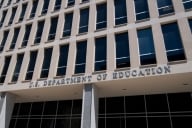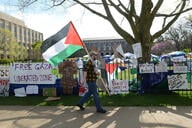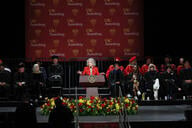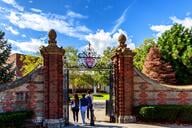You have /5 articles left.
Sign up for a free account or log in.
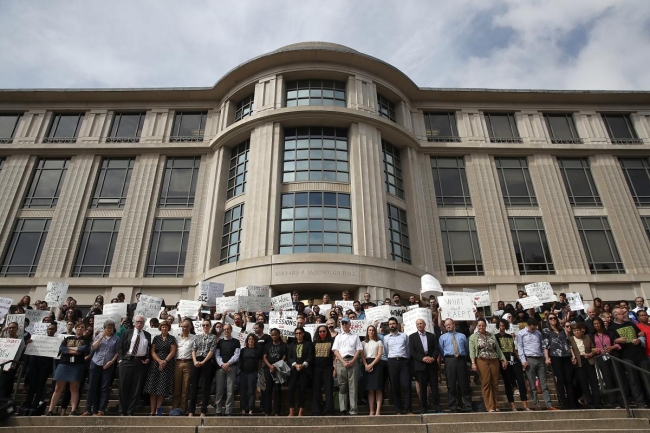
Students and faculty members protest former U.S. attorney general Jeff Sessions's visit to the Georgetown University Law Center in 2017.
Win McNamee via Getty Images
Georgetown University law students are worried school administrators will restrict their right to protest guest speakers on campus after a loud demonstration by students and faculty members interrupted a speech by a Trump administration official last year.
The protesters ultimately prevented Kevin McAleenan, former acting secretary of the U.S. Department of Homeland Security, from giving the keynote address last October during the school's annual Immigration Law and Policy Conference. By denying audience members the opportunity to hear McAleenan's speech, the protesters violated the university's written policies for speech and expression.
Administrators responded by reconvening the law center's Speech and Expression Committee to consider limitations and disciplinary measures against demonstrators at future speaking events.The committee made up of students, faculty members and senior staff was created in 2017 to examine how and where speech is expressed on campus.
William Treanor, dean of the Georgetown University Law Center, asked the committee to recommend whether to implement more specific guidelines for speech and expression on campus by spring 2020, according to a Jan. 16 email to law students. The email was signed by Mitch Bailin, the dean of students, and Peter Byrne, a professor and faculty director of two programs at the law school.
The committee was tasked with considering whether the law center should control who is invited to speak at the campus and who may invite them, what the law center’s response should be to “disruptive protests” during speaking events, and if “possible disciplinary or other administrative action” should be pursued against student and faculty member “disrupters” in the future, according to the email sent to law center students.
Students and faculty opposed to the Trump administration's controversial immigration policies made no secret of their objection to McAleenan's participation in the conference. They wrote a letter to Treanor on Sept. 30, calling on him to disinvite the acting secretary. The law school anticipated the protest and had additional staff members and security present. It also set up a designated area for demonstrators to gather outside the auditorium so as to not disrupt the speech or other classes and activities occurring in the building, a law school official said.
A group of more than 30 protesters gathered in the designated protest area, a hallway near the lobby of Hart Auditorium, where McAleenan was speaking, while others who had registered to attend the event sat in the audience and shouted the names of migrants who had died at the U.S.-Mexico border, said Cora Metrick-Chen, a third-year law student who participated in the “ICE-free GULC,” or Immigration and Customs Enforcement-free Georgetown University Law Center. (“ICE” is the acronym for the federal agency responsible for apprehending, detaining and deporting undocumented immigrants in the U.S.) The protesters, including some from outside community organizations who held banners in the auditorium, were opposing DHS’s immigration policies, specifically the separation and detention of migrant children and their parents at the border, Metrick-Chen said.
“By hosting Kevin McAleenan on campus as a keynote speaker, the school gave him an additional platform to speak on his policies,” Metrick-Chen said. “The school, as a top law school, has a powerful reputation, and inevitably by inviting him, it lends credence to his reputation and looks like an endorsement of his policy … I thought it would be shameful and perpetuating if there wasn’t a public response from students and from community members in opposition to that.”
McAleenan was “drowned out by the protesters’ chants” and “shouted down,” and he ultimately walked off stage, according to media reports. In a statement to Fox News the next day, Treanor expressed “regret that the audience did not get to hear from the secretary” and reaffirmed that the law school “is committed to free speech and expression and the ability of speakers to be heard and engage in dialogue.”
Georgetown’s current policy states, “It is a violation … to curtail the free speech rights of others. Actions that violate this policy include disrupting events to prohibit other students from hearing the views of an invited speaker.”
By preventing McAleenan from speaking, protesters were already breaching the free speech policy and should be punished, said a first-year law student who identified as a libertarian. He said he was disappointed by Georgetown's response and said it should have been prepared to remove disruptive protesters from the audience.
“I’m not arguing for any change, because as they’re written, they’re fine,” the student said of the current speech policy. “This is a factual disagreement, not a policy disagreement … A majority of the audience was there to listen, and there were four or five people who did not want to listen, and they got their way. That runs counter to the idea of free speech.”
Students and faculty members who participated in the protest are now worried their own free speech rights will be diminished by the recommendations of the Speech and Expression Committee, according to a letter written by some of the student protesters and signed by more than 130 other students, organizations and faculty members as of Jan. 24, Metrick-Chen said.
She said although the protest was "partisan" in nature, it addresses an issue that impacts all law students, regardless of their political leanings. Students fear administrators could “make it much harder or much riskier to protest” in general, Metrick-Chen said.
“Punishing protesters flies in the face of the law school’s commitment to free expression,” the law students wrote in another letter to Treanor this month. “We urge you to reject these changes … One does not have to support the cause of a specific protest to know that punishing peaceful protesters would have a chilling effect on free speech and expression across campus.”
Bailin said punishing students is not the driving force behind the re-evaluation of the protest policy.
"The committee’s work is completely prospective," he said in an interview. "We’re looking at how to address protests and potentially disruptive protests moving forward. We are not looking at disciplinary approaches and responses from students who protested Secretary McAleenan. It’s not our charge and it won’t be in our report, and I think members of the community have been confused by that."
Georgetown’s current policy allows faculty members and student groups to invite speakers to campus, and those who oppose a speaker may “protest peacefully in a manner that does not interfere with the audience’s right to listen,” said a statement from the law school.
“Georgetown Law is committed to upholding the values of free speech and expression and serving as a forum for the free exchange of ideas, even when those ideas may be difficult, controversial or objectionable to some,” the statement said. “The purpose of the process is not to punish past behavior, but to think through for the future how to best balance the competing concerns of the right to speak and the right to protest.”
The Speech and Expression Committee hosted its first "listening session" on Jan. 24 to discuss the committee's work and get input from students.
The first-year libertarian law student, who did not want to be identified, attended the session and said some students present supported punishing the protesters, but a majority opposed any punishment.
“There were some students who did not speak because of the fear of backlash from the protesters,” the student said. “They’ve already demonstrated themselves to be uncaring about others’ opinions. If they speak out against these protesters who have power on campus, they will come after them and disrupt the lives of others.”
Students opposed to the committee’s deliberations are asking for more transparency and that all law students be invited to all guest speaker events, which is not current practice. Faculty members are currently permitted to invite speakers to a particular course or program and limit attendance to only students enrolled in that course or program, a law school official said.
Metrick-Chen said Georgetown “seems to be sneaking people in when it’s controversial.”
The student protesters also oppose academic sanctions or disciplinary action against students or faculty members who participate in protests, and want administrators to stop the practice of designating specific spaces for protests, she said.
“Personally I think it’s complicated to juggle the role of a protester and the role of a law student who cares about the expressive health of the institution … I believe that the school should let its speakers speak,” Metrick-Chen said. “The responsibility is on the authority in place to ensure that free speech happens. It doesn’t stop protesters from protesting.”

